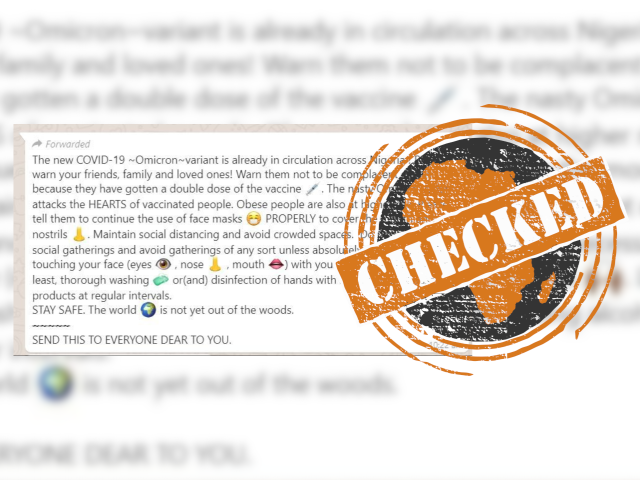A meme with the eye-catching heading “DANGEROUS” claims onions become poisonous if they’re cut, left overnight and used the next day.
Posted on Facebook in South Africa, it reads: “Please remember that it’s dangerous to cut an onion and try to use it to cook the next day. It becomes highly poisonous for even a single night and creates toxic bacteria which may cause adverse stomach infections due to excess bile secretions and even food poisoning.”

The US National Onion Association has debunked the claim as “false”. In a statement on its website, it says onions are not poisonous when handled properly and can be stored in the fridge in a sealed container for up to seven days after being cut.
“When cut, onions release compounds that do not promote pathogen growth,” it says.
“Juice released from cut onions is known to kill or inhibit the growth of many different types of microorganisms, including some of those capable of causing food poisoning in humans.”
According to a 2017 article by Joe Schwarcz, the director of the Office for Science and Society at McGill University, onions are not especially prone to bacterial contamination. It’s actually the opposite.
Cutting an onion releases enzymes, starting a chemical reaction that produces sulphuric acid (the cause of “onion tears”). Sulphuric acid slows the growth of bacteria.
The claim that onions are "bacterial magnets" makes little sense because “no food attracts bacteria”, says Schwarcz. But some foods are more likely to support bacteria or viral contamination once they’re infected.
Cutting boards and dirty hands are also possible sources of bacteria on onions.
“There is no reason to suggest that onions are in any way more risky than other foods and avoiding onions is not only unnecessary but unhealthy.”
Onions have several health benefits. They stimulate the growth of beneficial bacteria that “suppress the growth of potentially harmful bacteria in the colon”, Schwarcz says.
Fact-checking site Hoax-Slayer has also rated the meme as false. “The claim that onions are ‘magnets’ for bacteria has no scientific validity,” it says.
Leftover raw onions are no more unsafe than any other food, if they are correctly handled and stored, according to Hoax-Slayer. “The claims in the message have no factual basis and passing on this pointless piece of misinformation will not help anyone.”
Hoax or Fact says onions are “good to use, especially because they are high in vitamin C” and “a good source of fibre and other important nutrients”.
Safely handled onions are are healthy to eat, even if you cut them the night before. – Taryn Willows
Posted on Facebook in South Africa, it reads: “Please remember that it’s dangerous to cut an onion and try to use it to cook the next day. It becomes highly poisonous for even a single night and creates toxic bacteria which may cause adverse stomach infections due to excess bile secretions and even food poisoning.”

Juices from onions kill bacteria
The US National Onion Association has debunked the claim as “false”. In a statement on its website, it says onions are not poisonous when handled properly and can be stored in the fridge in a sealed container for up to seven days after being cut.
“When cut, onions release compounds that do not promote pathogen growth,” it says.
“Juice released from cut onions is known to kill or inhibit the growth of many different types of microorganisms, including some of those capable of causing food poisoning in humans.”
And onions are good for you
According to a 2017 article by Joe Schwarcz, the director of the Office for Science and Society at McGill University, onions are not especially prone to bacterial contamination. It’s actually the opposite.
Cutting an onion releases enzymes, starting a chemical reaction that produces sulphuric acid (the cause of “onion tears”). Sulphuric acid slows the growth of bacteria.
The claim that onions are "bacterial magnets" makes little sense because “no food attracts bacteria”, says Schwarcz. But some foods are more likely to support bacteria or viral contamination once they’re infected.
Cutting boards and dirty hands are also possible sources of bacteria on onions.
“There is no reason to suggest that onions are in any way more risky than other foods and avoiding onions is not only unnecessary but unhealthy.”
Onions have several health benefits. They stimulate the growth of beneficial bacteria that “suppress the growth of potentially harmful bacteria in the colon”, Schwarcz says.
‘No scientific validity’
Fact-checking site Hoax-Slayer has also rated the meme as false. “The claim that onions are ‘magnets’ for bacteria has no scientific validity,” it says.
Leftover raw onions are no more unsafe than any other food, if they are correctly handled and stored, according to Hoax-Slayer. “The claims in the message have no factual basis and passing on this pointless piece of misinformation will not help anyone.”
Hoax or Fact says onions are “good to use, especially because they are high in vitamin C” and “a good source of fibre and other important nutrients”.
Safely handled onions are are healthy to eat, even if you cut them the night before. – Taryn Willows
Republish our content for free
For publishers: what to do if your post is rated false
A fact-checker has rated your Facebook or Instagram post as “false”, “altered”, “partly false” or “missing context”. This could have serious consequences. What do you do?
Click on our guide for the steps you should follow.
Publishers guideAfrica Check teams up with Facebook
Africa Check is a partner in Meta's third-party fact-checking programme to help stop the spread of false information on social media.
The content we rate as “false” will be downgraded on Facebook and Instagram. This means fewer people will see it.
You can also help identify false information on Facebook. This guide explains how.





Add new comment